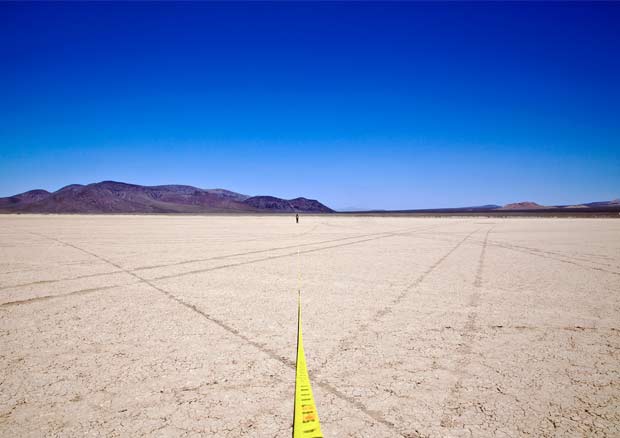Unfold the Untold – Conversation between Jeannette Ehlers and Nikolaj Recke
Jean: Hey Nik I am glad you returned from the States in time for us going to Bern on the PROGR residency. What did you do over there?
Nik: First of all I attended an opening of mine Speculative Spaces at The Luminary in St Louis, but before that I went looking for a buried city called Time Beach. This small city on Route 66 and at the riverbanks of the Meramec River, have a tragic story. The city was totally demolished because of dioxin pollution in 1983, and buried deep under tons of earth. I went there with my video camera to see if there were any traces left from the early 80’ties. But scary as it is there wasn’t even a little sign of what once was a city left, only people in the nearby town Eureka and their stories of what happened 30 years ago.

Nikolaj Recke, 300 FEET AWAY FROM YOU
Jean: Sounds really interesting. So you are digging up hidden History? That’s just like I do within a different field though. My cultural background is Danish / Trinidadian and my father is a descendant of enslaved Africans. In my artistic practice it’s been crucial to shed light on untold stories. For example about the Danish participation in the transatlantic slave trade, which indeed is a forgotten and untold chapter in History and in the common Danish consciousness. Through photo and video based works, that have a strong personal approach but are mostly created in a subtle and poetic manner, I bring the past into the present and make it visible and current. The Transatlantic slave trade built Modern society and people tend to forget that again and again and again. Colonial structures are deeply embedded in everyday life in almost every detail. I’m inspired by “Decolonial thinking ” which confronts and questions the European colonial history from different perspectives, in an attempt to break with the Eurocentric structures that dominate the world.
Nik: That’s what I like in your work, the direct confrontation and the über-political agenda. I think we have similarities in working with political content in our projects, but you have an intention that we all should know it, where I tend to hide it a little bit.
In my recent film Mono Lake Revisited, – a remake of an old unfinished Robert Smithson film, is on the narrative side a romantic road movie about early Land Art artists, a Lake in California and crystals hard to find, but underneath covers a dystopian story about a huge man made disaster in the 40’s when Los Angeles and Las Vegas needed more water supply. Guess what I try to do, like I did in the piece Trinity Land Art Institute; I use art history as a material to renegotiate the increasingly tense relationship between nature and man’s civilizing engage in it. Well for me it is a question about what role art, the aesthetic design and narratives can play face to face with an ethical problem such as nature’s destruction, but my works are not attempts to solve the problem, but an experimental and speculative study of the conditions of the problem.
Jean: I find your artistic way of handling Historical events very intriguing and I love the subtlety in your work. My work is also quite experimental in its nature and I always strive for creating simple, yet complex pieces. Like for example my latest piece “Whip it Good” which is based on a live performance in which I whip a painting. Or the piece “ Black Magic At The White House”, that is a video that I have shown here in Bern at videokunst.ch.
Jeannette Ehlers, Black Magic At the White House, 2009
In the video I am dancing a ghostly vodou inspired dance in a house called Marienborg, which is located a bit outside of Copenhagen. The house has a strong connection to the Transatlantic slave trade and was built as a summer residence for the Commander Olfert Fischer in 1744, and after him it has been in the hands of many other trade men who made their wealth from the slave and sugar trade, and who even brought enslaved Africans to Marienborg as workers and servants. Today Marienborg functions as the official residence of the country’s prime minister. Food for thought! Of course aesthetics plays a huge role and on top of that to me art is a space for intuition as well as for reflection, resonance, self-education and empowerment. – Now what can we conclude from all this?
Nik: That art is a good place to unfold the untold.
Jeannette Ehlers and Nikolaj Recke would like to thank Carola and Günther Ketterer, Peter Aerschmann, Sophie Schmidt and The Danish Arts Council for their support.
Veröffentlicht unter Gastbeitrag
Schlagwörter: residency.ch, Videokunst

